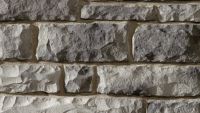City Governments Across the State of Texas
By Masonry
City governments across the state of Texas are feeling the financial squeeze created by finite land being the primary source of revenue for property and sales taxes. By requiring the increased use of quality masonry products within city limits in residential and commercial areas, several Dallas/Fort Worth-area cities are seeing property values increase and sales tax revenues bolstered by quality businesses wanting to locate in more attractive areas.
In support of this trend, the Southwestern Brick Institute has embarked on a program to assist municipalities with "quality development," in residential and commercial zones, by addressing code requirements that encourage increased use of masonry products.
Residents of cities who proactively protect their tax base by enacting masonry ordinances benefit in many ways. The increased revenue coming into the city in the form of taxes provides the funding needed to maintain excellent schools, parks and libraries, as well as ensuring that law enforcement and emergency services are adequately funded. On an aesthetic level, cities with masonry ordinances just look better and tend to attract high-quality businesses and residents.
In the City of Sanger, Texas, a recent request to address metal building codes in commercial areas prompted the city to evaluate their construction codes in commercial and residential areas. The city ? led by Mayor Tommy Kincaid and his council, City Manager Jack Smith and City Secretary Rose Chavez ? increased the residential masonry requirements to 100% and the commercial requirements to 90%. Previously, masonry requirements were only 10% for residential and 50% for commercial.
Bob Dillard, the City Attorney for Sanger, assisted the council in drafting ordinances that give the city a more progressive quality approach, much like the approach taken in high-growth Flower Mound. Doug Collins, Deputy Director of Planning in Flower Mound, sees Flower Mound's commitment to quality development in residential and commercial areas as strongly supported by its 100% residential masonry requirement and its 50% commercial requirement. The city actively reviews commercial development plans to ensure that large retailers design and construct buildings that complement the overall architectural style of the business district.
In addition to Flower Mound, the Cities of Hurst, North Richland Hills and Wylie are aggressively seeking to ensure quality code improvements to maximize the most important source of financing for city services in the future. Wylie just announced a 100% masonry residential requirement, and the City of Hurst is adding brick fences to many of its new subdivisions to decrease noise and create a more distinctive appearance.
Southwestern Brick Institute (SWBI) Executive Director Glen Duncan notes, "Seeing city leaders, planners and development specialists concentrate on 'front-end development' is exciting for the residents and business owners alike. Both groups see quality construction requirements as an insurance policy that protects the future value and appreciation of their investment."
For more information, contact SWBI at (800) 733-1813 or visit www.swbrick.com.
About the Author
Masonry, the official publication of the Mason Contractors Association of America, covers every aspect of the mason contractor profession - equipment and techniques, building codes and standards, business planning, promoting your business, legal issues and more. Read or subscribe to Masonry magazine at www.masonrymagazine.com.


















